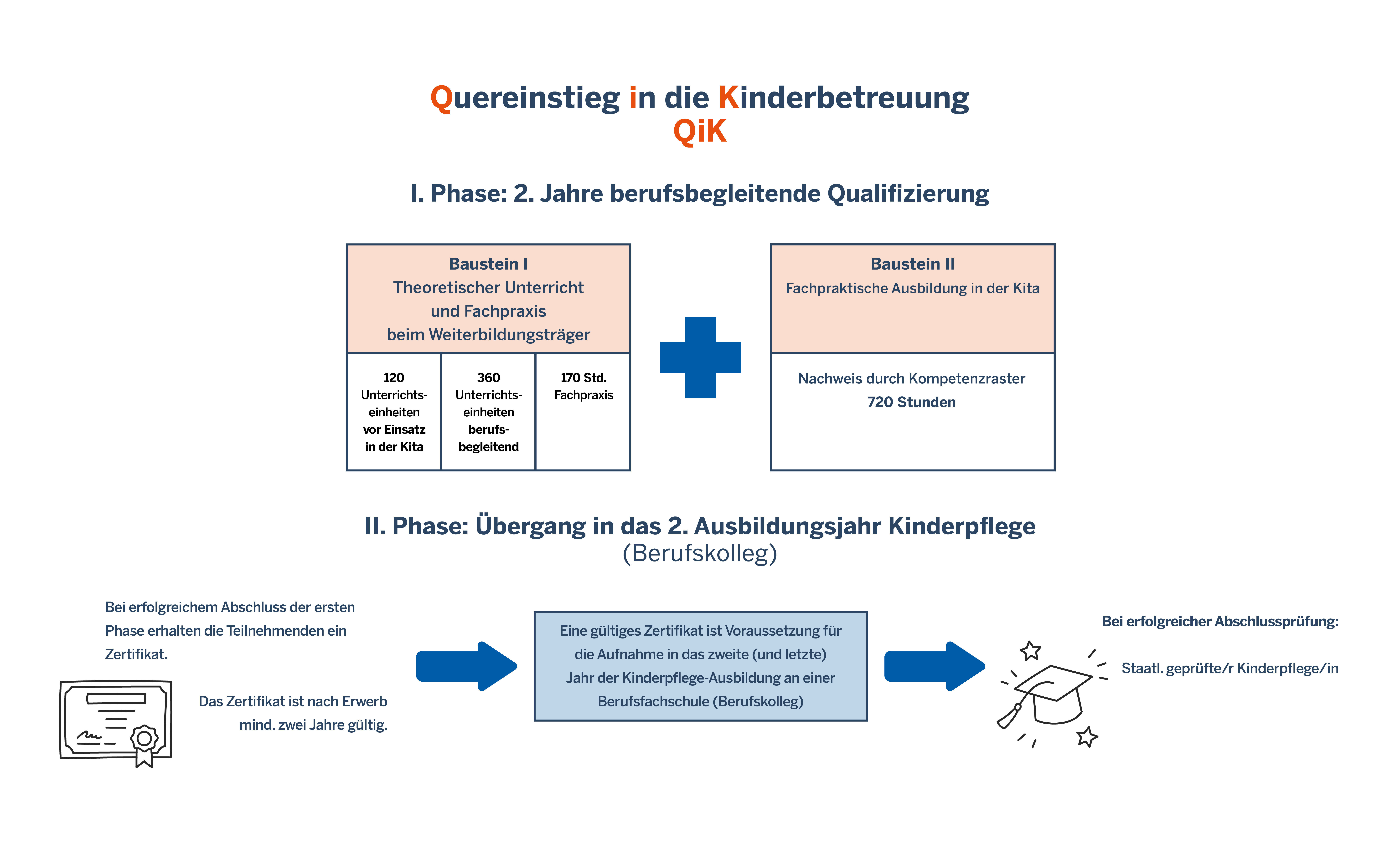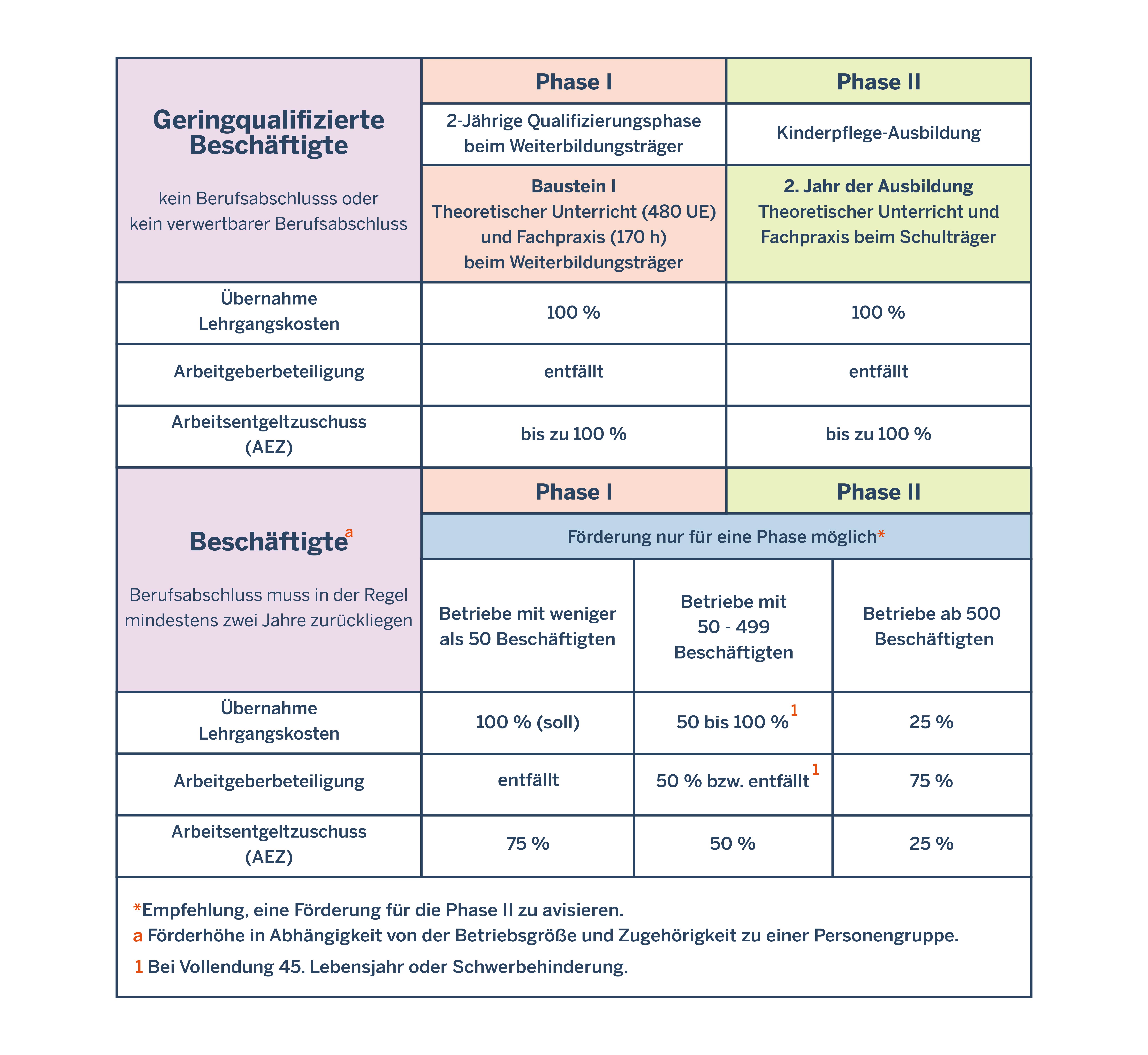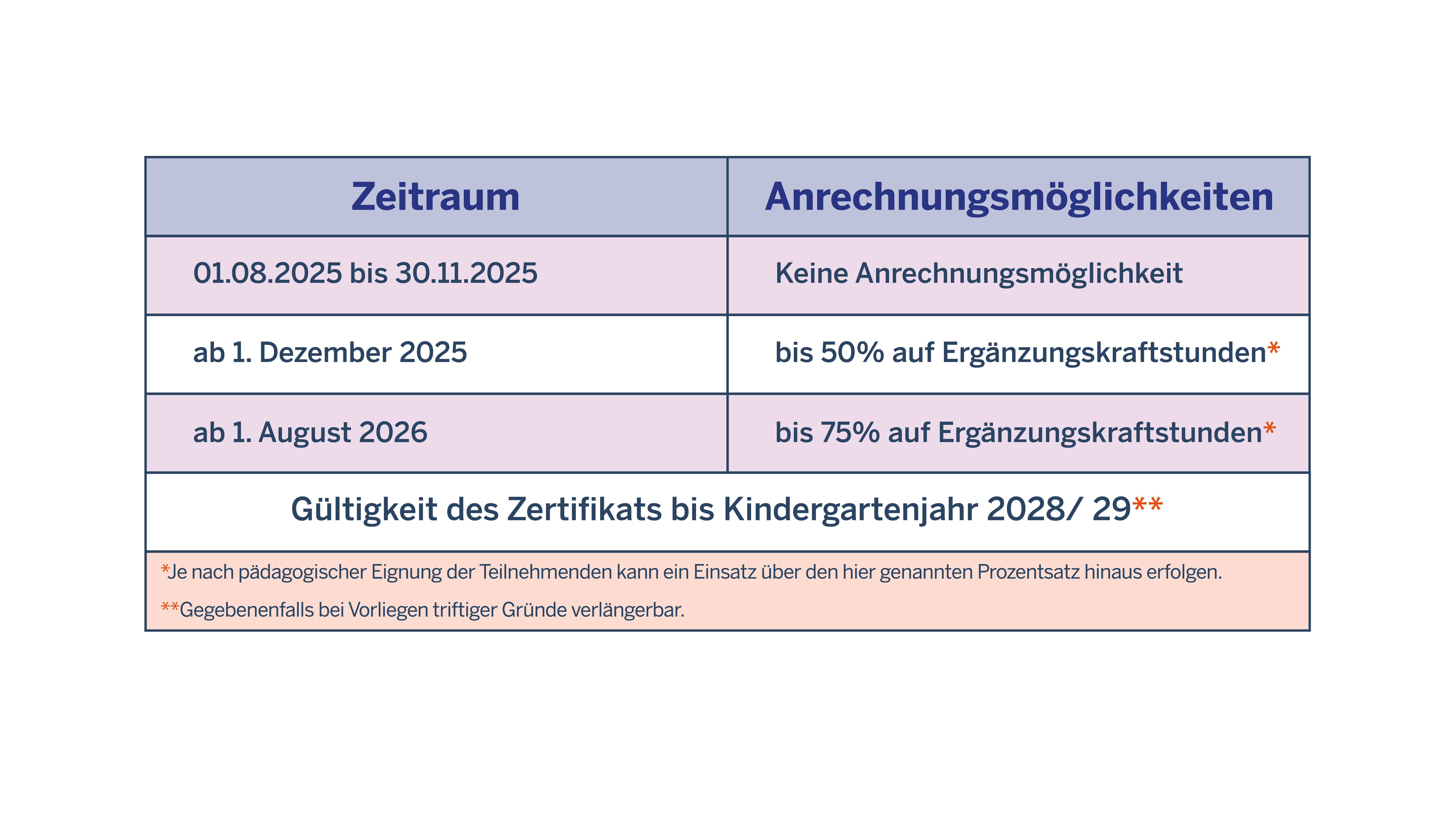
Lateral entry (QiK)
Lateral entry into childcare - QiK
The "lateral entry into childcare" model (QiK)
The "lateral entry into childcare" (QiK) model provides for lateral entrants to quickly start working in childcare facilities and then complete two years of in-service training. After this, childcare training can be taken up, but this can be shortened by one year (one year instead of two). Childcare assistants can be employed in all types of groups in daycare centers and can also be counted towards the so-called minimum staffing level in groups where only children over the age of three are cared for. In addition, this professional qualification is also a possible prerequisite for admission to further training to become a "state-recognized educator" (more on this here).
Employment contracts should exist during both the qualification and training phases, i.e. lateral entrants to QiK have a reliable income.
The providers receive financial subsidies from the Federal Employment Agency for the deployment of QiK lateral entrants. There are also additional options for counting both QiK trainees and existing staff towards the minimum staffing level.
This model provides daycare facilities with additional staff in a timely manner and ensures the quality of education and care.
Development of a qualification according to QiK

The QiK model is basically structured in two phases:
- Phase: Qualification phase at the training provider and in the childcare facility
- Phase: Entry into the 2nd year of training in accordance with state law "State-certified childcare worker" at the vocational college
.
The first phase of QiK involves completing a qualification in the form of two parallel modules within two years:
- The first module comprises a qualification at a further education provider. This qualification must comprise at least 480 teaching units of specialist theory and, in order for the measure to be eligible for funding from the Federal Employment Agency, 170 hours of specialist practice. Of the 480 teaching units of specialist theory, 120 teaching units must be completed at the beginning of Phase I.
- The second module comprises 720 hours of practical training. The Ministry of Schools and Education has published a skills grid to support the verification process (see below).
If the 480 teaching units of specialist theory and 720 hours of practical training are successfully completed, a certificate valid for two years is issued.
A valid certificate enables the transition to the second phase of QiK at the beginning of each school year with admission to vocational training in accordance with state law "State-certified childcare worker" at a vocational college. Here, however, the qualifications acquired so far are taken into account, so that the second (and final) year of the childcare training can be entered directly.
Funding opportunities for the sponsors
The QiK employees are supported via the "Employee qualification (BQ)" program.

Support services include
- both the (possibly pro rata) assumption of the course costs incurred for the certified costs of the qualifications (first phase: costs as part of the further training course module at the further training providers; second phase: costs as part of the second year of childcare training at the vocational college)
- and a subsidy for lost working hours due to further training. Phase: Costs incurred as part of the second year of training as a childcare worker at the vocational college)
- as well as an allowance towards wages for periods of absence due to further training (I. Phase: Allowance for periods of time off to participate in the further training course module, i.e. 480 units and 170 hours of specialist practice; II. Phase: allowance for time off to attend the second year of training as a childcare worker at a vocational college)
.
The phase in which support can be offered depends on the individual professional experience of the participants (= individual case assessment):
- For participants who do not have a (usable) vocational qualification, support can be provided in both phases.
- For participants who have acquired a vocational qualification, support can only be provided in one phase. In this case, it is recommended that funding is only applied for in phase II.
Background: A "funding exclusion" applies here within a period of 2 years after initial funding. Renewed support is only possible again after two years (basis: Section 82 SGB III).
Options for offsetting against the minimum personnel value
The QiK participants can be credited for supplementary staff hours as follows:
- The first three months after completing the initial qualification of 120 units: No crediting possible.
- The period after these three months until the end of the kindergarten year (July 31): Up to 50% of the working time spent at the facility.
- The period from the following kindergarten year (August 1) until the expiry of a valid certificate: 75% of the working hours performed at the facility.
- In agreement with the youth welfare offices, the provider may, in justified cases and if the appropriate conditions for success are met (in particular management, practical instruction, no conditions imposed by the LJÄ on the operating license that affect the training relationship), count towards supplementary staff hours beyond the options in points 2 and 3. The state youth welfare offices will be informed.
The following diagram illustrates the crediting options for the QiK cohort, which is due to start in the 2025/26 kindergarten year:

Additional crediting options
The participating providers are also allowed to credit supplementary staff already working in the facility for specialist hours in group types I and II under the following conditions:
- Only one supplementary staff member per facility may be credited in this way for specialist hours in group types I and II.
- The supplementary staff member must have 5 years of professional experience.
- Only permitted in facilities with at least three groups.
- The supplementary staff member may not be a group leader.
The existing additional deployment options in accordance with the PersVO remain unaffected.
Municipalities that implement QiK
The model has been tested for the first time since September 1, 2024 in the city of Mönchengladbach with 18 participants. The intention is to test the QiK model with other municipalities starting in the 2025/26 nursery year.
Contact persons in the municipalities intending to implement the model for the 2025/26 nursery year:
City of Mönchengladbach
Ouafaa El Issaoui
Email: Modellkommune[at]moenchengladbach.de (Modellkommune[at]moenchengladbach[dot]de)
Phone: 02161 / 25 72 53
Rheinisch-Bergischer Kreis
Michelle Euteneuer
Email: familie[at]rbk-online.de (familie[at]rbk-online[dot]de)
Phone: 0 22 02 / 13 6537
Kreis Steinfurt
André Scheipers
Email: andre.scheipers[at]kreis-steinfurt.de (andre[dot]scheipers[at]kreis-steinfurt[dot]de)
Phone: 0 25 51 / 69 2473
Links
- BASS 2024/2025 - 13-33 Nr. 13 Anrechnungsmöglichkeiten der Qualifizierungsmaßnahme „QiK- Einstieg in die Kinderbetreuung“ für den Quereinstieg in das 2. Ausbildungsjahr „Staatlich geprüfte Kinderpflegerin/ Staatlich geprüfter Kinderpfleger“, APO-BK Anlage
- Im Erlass ist der Link zum Kompetenzraster zu finden, dass mit weiteren Hilfsdateien auf der Seite der Qua-LiS NRW zu finden ist: Berufsbildung NRW - Bildungsgänge/Bildungspläne - Berufsfachschule (Anlage B) - Materialien/Handreichungen
- Weitere Umsetzungshinweise zu den Vorgaben einer Teilqualifizierung gemäß Beschäftigtenqualifizierung finden Sie unter: Zertifizierung und Konstruktionsprinzipien TQ